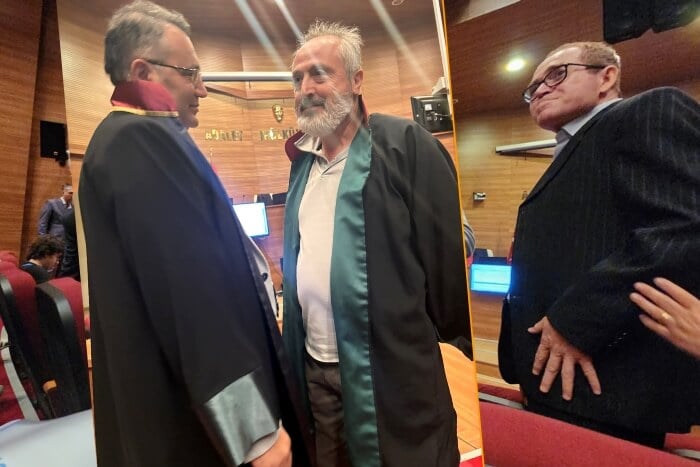Fatma Zibak
A high criminal court in central Turkey has in a retrial again convicted former teacher Yüksel Yalçınkaya of terrorism due to his links to the faith-based Gülen movement, despite a landmark decision from the Grand Chamber of the European Court of Human Rights (ECtHR) last year in his favor.
The second and final hearing of Yalçınkaya’s retrial was held at the Kayseri 2nd High Criminal Court on Thursday.
Yalçınkaya attended the hearing with his lawyer, Özcan Akıncı, who delivered a defense statement.
Other lawyers and rights activists were also present in the courtroom, along with Yalçınkaya’s family. Hundreds of thousands of people who were convicted in trials similar that of Yalçınkaya in the aftermath of a failed coup in July 2016 were eagerly awaiting the court’s decision with the expectation that it could set a precedent for their own trials.
The Kayseri court handed down the same sentence of six years, three months to Yalçınkaya on charges of terrorist organization membership due to his links to the Gülen movement in line with the opinion of the prosecutor. Yalçınkaya first received this sentence in 2017, which he successfully challenged at the ECtHR after exhausting domestic remedies.
“For years, I have benefited from this state and its services. I cannot be a terrorist. I love my homeland and its people. I want my acquittal,” Yalçınkaya told the court before the announcement of the verdict.
The former teacher was one of more than 130,000 civil servants purged from public service due to their alleged links to the Gülen movement or terrorist groups in the aftermath of the coup attempt, through government decrees that were not subject to judicial review.
The Gülen movement is accused by the Turkish government and President Recep Tayyip Erdoğan of masterminding the failed coup and is labeled a “terrorist organization,” although the movement denies involvement in the coup attempt or any terrorist activity.
In September 2023 the Strasbourg court ruled that Yalçınkaya’s conviction violated three articles of the European Convention on Human Rights (ECHR): Article 6, which concerns the right to a fair trial; Article 7 on no punishment without law; and Article 11 on freedom of assembly and association.
Yalçınkaya’s conviction in 2017 was based on his bank account, labor union membership and use of a mobile messaging application called ByLock.
ByLock, once widely available online, has been considered a secret tool of communication among supporters of the Gülen movement since the coup attempt on July 15, 2016, despite the lack of any evidence that ByLock messages were related to the abortive putsch.
The Kayseri court’s decision on Thursday also came against the backdrop of witness statements in Yalçınkaya’s favor. One witness, who was on the list of people in Yalçınkaya’s ByLock account, said he met the former teacher only in prison and had not known him before, while another witness also said he did not see Yalçınkaya attending Gülen-related religious talks.
Yalçınkaya has the right to appeal the court’s decision.
The Grand Chamber based its ruling on Yalçınkaya’s alleged use of the ByLock app, membership in a labor union and an association affiliated with the Gülen movement, and having an account at the now-closed Bank Asya, all of which are considered signs of membership in the Gülen movement and criminal evidence by Turkish authorities.
Following the coup attempt the Turkish government accepted such activities as benchmarks for identifying and arresting alleged followers of the movement on charges of membership in a terrorist organization.
The Strasbourg-based court also said the problem related to the use of ByLock as evidence was systemic, calling on the Turkish authorities to address thousands of similar cases.
Legal experts said the Grand Chamber’s decision clarified that the use of ByLock, depositing money at a Gülen-linked bank or being a member of a Gülen-affiliated association cannot be considered criminal evidence against Gülen movement members.
Lawyer disappointed

Johan Heymans, one of the lawyers who represented Yalçınkaya at the ECtHR, expressed disappointment with the Kayseri court’s decision in a phone interview with Turkish Minute on Thursday, saying it was “sad to see” there is no more rule of law in Turkey and that the basic principles of law are disregarded by the courts.
Heymans said the local court’s decision to ignore the ECtHR ruling on Yalçınkaya will have consequences for the entire judicial system, leading courts to make different rulings for other defendants facing similar charges since the ECtHR decision has not been taken as a precedent.
When asked about the prospects of the launch of infringement procedures against Turkey by the Committee of Ministers of the Council of Europe (CoE), which monitors the enforcement of ECtHR judgments, Heymans said the court’s decision today is “incomplete” without a review by the appeals court, so the appeals process had to be exhausted before the CoE takes any action.
The CoE already launched infringement procedures against Turkey in February 2022 due the non-implementation of ECtHR’s 2019 ruling about jailed businessman Osman Kavala.
Kavala was arrested in 2017 and sentenced to life in prison in 2022 for allegedly trying to topple then-prime minister and current president Recep Tayyip Erdoğan’s government by organizing the Gezi Park protests, which erupted in the summer of 2013 in opposition to government plans to destroy a park in central İstanbul.
The ECtHR judgment in December 2019 found his detention to be arbitrary, politically motivated and in pursuance of an “ulterior motive,” that of silencing him as a human rights defender.


